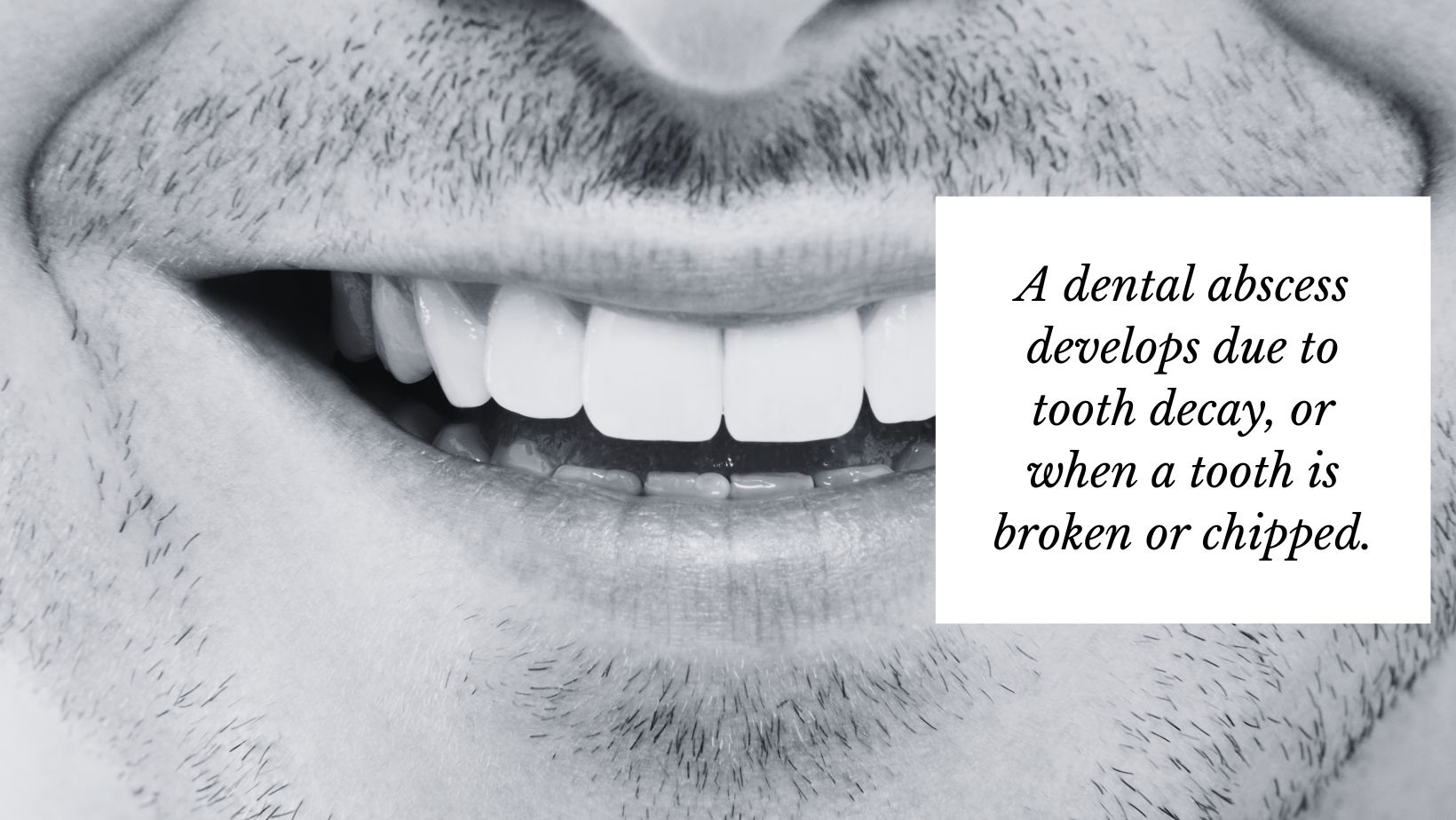No one loves going to the dentist. But if you have severe tooth pain accompanied by swollen gums and a pocket of pus, it is in your best interest to drop everything and make an appointment. Chances are you have a dental abscess, and those do not usually heal without professional treatment.
How a Tooth Becomes Abscessed
A dental abscess develops due to tooth decay, or when a tooth is broken or chipped. Cavities and cracks allow bacteria to get past the tooth’s protective enamel, through the soft layer of tissue called dentin, and into the tooth’s pulp. This causes an infection in the pulp called pulpitis, which can cause severe tooth pain and gum inflammation. In an attempt to keep the infection from spreading, the body forms a pocket of pus called an abscess – which is actually filled with bacterial fluid.
According to the Mayo Clinic, patients are most at risk for a dental abscess if they have:
- Poor oral hygiene habits. Not brushing teeth twice a day and forgetting to floss allows bacteria to settle into the teeth and gums.
- A diet high in sugar. Foods and beverages containing lots of sugar can lead to cavities and, if left untreated, turn into a dental abscess.
- Dry mouth. Having a dry mouth increases chances of tooth decay.
Signs of a Dental Abscess
Only a dentist can diagnose a dental abscess, but there are multiple common signs that point to this type of infection.
- Swollen gums along with a red bubble filled with pus
- Severe pain while chewing
- A strong feeling of pressure
- A swollen face and/or jaw
- Sensitivity to hot or cold
- Bad breath and/or bad taste
In severe cases, swelling can extend to lymph nodes in the neck, and a fever may be present.

Why You Should Leave Dental Abscess Treatment to a Professional
When an infection makes its way into the tooth and gums, it will not heal on its own. A dentist must treat the abscessed tooth to prevent the infection from spreading, so it is very important to make an appointment immediately. Even if the abscess bursts at home, it does not mean the infection is cured.
While waiting to be seen by a dentist, you can practice dental abscess self-care measures to reduce pain and swelling:
- Take ibuprofen. This is a Non-Steroid Anti Inflammatory Drug, which will reduce inflammation around the affected tooth. If pain is severe, alternate ibuprofen and acetaminophen every two hours.
- Use a cold compress. Place ice cubes in a towel and hold it on the cheek outside of the affected area. Repeat in 15 minute intervals.
- Rinse with saltwater. Saltwater stalls bacterial growth and reduces inflammation. Mix ½ teaspoon salt with ½ cup warm water and swish for two minutes. Repeat several times throughout the day.
How a Dentist Will Treat Your Dental Abscess
Because the fluid inside the abscess is infected, a dentist will first need to drain the pus that has collected under the gums. If it has already burst, he will clean the site thoroughly and examine where the infection started. Imaging tests such as x-rays will verify which tooth is infected, the reason for the decay, and how far the infection has spread. An antibiotic will most likely be prescribed.
If the dentist thinks the tooth can be saved, he will perform a root canal to remove infected nerves and blood vessels. A dental crown may be added to seal the tooth. For most patients, local anesthesia is sufficient for preventing pain during the procedure, but those who are more anxious about dental procedures may request sedation.
Some dental abscesses do too much damage to save the tooth with a root canal. If so, the tooth will be removed and your dentist will discuss options to replace it, such as a dental bridge.
What if I Don’t See a Dentist About My Dental Abscess?
When a dental infection spreads, it can lead to serious consequences. Again, this is why dental abscess self-care is not an option. Immediate professional treatment is crucial.
The chance of losing the infected tooth increases if you ignore the pain. Not only that, but as the infection spreads, it becomes dangerous to your health. An untreated abscess can lead to:
- A sinus infection, particularly when an upper molar infection travels to sinuses.
- A jaw bone infection, which can cause other teeth to fall out.
- Ludwig Angina, a serious infection that compromises parts of the face and lower jaw. If this progresses, it can block the airways and cause death.
- Inflammation of the inner layer of the heart, or Endocarditis, causing permanent heart damage.
- A brain abscess. If the infection travels through blood vessels to the brain, surgical intervention will be needed.
- A blood infection, also known as sepsis. This can lead to organ damage and even death.
Tips for Preventing a Dental Abscess
The best way to avoid a tooth infection is to practice good oral hygiene. This keeps bacteria from settling into the mouth and causing decay.
- Brush twice a day with a fluoride toothpaste, and consider rinsing with antiseptic mouthwash.
- Floss daily to remove debris between the teeth..
- Get a new toothbrush every three months..
- Schedule dental cleanings twice a year.
It is also best to avoid sugary foods and drinks. They are occasionally fine, but just make sure to brush immediately afterward.
Contact a Dentist Near You Today
Oral pain should never be ignored, especially if you also see a red blister filled with pus. Make an appointment with your dentist right away to get relief and prevent the infection from spreading. If you need help finding a dentist near you, use our online search tool.


